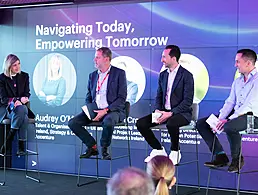From the silent generation and boomers, to Gen X and millennials, every generation has experienced the workplace differently, but Gen Z are perhaps the most unique group yet.
The opportunity to rise within an organisation and earn a spot in a leadership position, for many previous generations, was viewed as a great incentive to work hard and commit to a company. Where Gen Z employees are concerned that is no longer the case.
Conscious unbossing, that is the act of prioritising personal growth over advancing through the ranks, is becoming increasingly popular among younger people. So, how do you inspire Gen Z employees to learn and grow with a business, when they may not aspire to climb the career ladder?
“We know that many younger workers today prioritise their flexibility, personal wellness, and autonomy over working towards traditional hierarchical roles and management positions,” said David Satterwhite, the CEO of employee development platform Chronus.
“With growing pressure and higher-stakes responsibilities placed on middle managers, particularly as companies downsize, there’s a strong desire for a healthier work-life balance and a focus on self-development that has dissuaded some from looking at these roles.”
Moreover, Satterwhite is of the opinion that Gen Z’s hesitance to adopt leadership positions or even work towards them has more to do with an inherent disengagement crisis and the failure of companies to encourage those in leadership roles to forge a mutually beneficial connection with the workforce.
“This missing piece of leadership has made the positions look like glorified pencil pushers with more pressure and stress. Who would want that?,” he asks. “But that’s not what leadership roles should look like. That side of entering leadership roles has to change if Gen Z’s perspective on the opportunity is going to change.”
A change in leadership
Research, for example figures from a recent Deloitte report on millennial and Gen Z working attitudes, indicate that younger employees will often prioritise purpose and fulfilment over having seniority in the workplace. However, whether Gen Z employees choose to climb the career ladder or not, it doesn’t negate the need for significant upskilling to stay ahead of changing industry demands.
“Choosing autonomy over a traditional management path doesn’t eliminate the need for skill development, knowledge advancement, or mentorship, these employees still benefit from guidance and growth opportunities even if they bypass the traditional corporate ladder.”
For Satterwhite it is crucial that employers and leaders make efforts to better understand the aspirations and personal goals of many Gen Z workers, as despite an unwillingness to aspire towards management positions, they have much to offer the workforce and are vital to organisational success.
“Perhaps we haven’t made the management path or existence all that appealing to this younger generation. There’s been a history of management ineffectiveness in the last decade (if not longer). Just look at the ‘unbossing’ companies have been going through in the last six months.
“People aren’t being properly prepared to be managers and then we’re surprised when they don’t perform well, or their teams don’t look to their career journey for inspiration. If we were to provide these people with better training, mentorship and progress, to build empathetic, competent leaders, we might see this disinterest in the management path change.”
Striking a balance
While everyone within the Gen Z category is of course an individual, with personalised needs and wants, many younger employees in this group share similar traits and aspirations when it comes to company expectations. For example, they typically value autonomy, creative freedom and are keen problem-solvers.
According to Satterwhite, to strike a balance when it comes to Gen Z and in-house development, organisations can implement a number of strategies, such as encouraging Gen Z workers to collaborate with mentors, who can offer guidance, knowledge and the benefit of experience.
Flash mentoring and one-time sessions with peers or colleagues, as part of continuous learning opportunities may also appeal to them, as a way to gain experience in relation to skills, systems and processes.
As noted by Satterwhite, education and development is a two-way street and in this day and age, we could all benefit from listening to the people around us, gaining from their knowledge and perhaps imparting some of our own. Reverse mentoring, that is the process of offering guidance to someone who outranks you, promotes cognitive diversity and strengthens teams.
“A key way to bring together different generations of employees is through reverse mentoring. This flips the traditional mentorship model, allowing younger employees to guide senior leaders, leveraging the unique insights and skills of different generations.
“This approach fosters stronger intergenerational relationships, enhances DEI initiatives and empowers newer hires by acknowledging their value within the organisation,” he said.
Finding common ground
Incentivising a generation that does not aspire to climb the company career ladder, does not have to be a battle or an impossibility. Really, it is about finding common ground, identifying what matters to employees and figuring out how that aligns with wider company goals and expectations.
Millennials and Gen Z employees are two of the first generations within the modern workforce to prioritise sustainability and DEI initiatives ahead of career development simply because issues like that matter. Through mentorship, workplace flexibility and social impact projects, employers can relate and appeal to Gen Z employees and better understand their motivations.
“Clearly, we need to meet each generation where they are. That includes enabling and improving mentorship opportunities, building connections across colleagues and teams and activating employee purpose through development programmes that inspire and retain employees in whatever roles they choose for their careers.
“That said, we can’t lose sight of the need to improve leadership and management. I strongly believe that if we provide effective development for our leaders and managers, enabling them to excel and thrive in these roles, Gen Z will be more likely to embrace the leadership path.”
Don’t miss out on the knowledge you need to succeed. Sign up for the Daily Brief, Silicon Republic’s digest of need-to-know sci-tech news.




